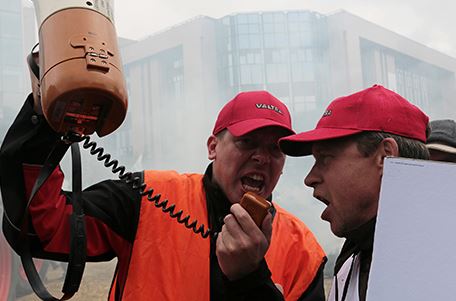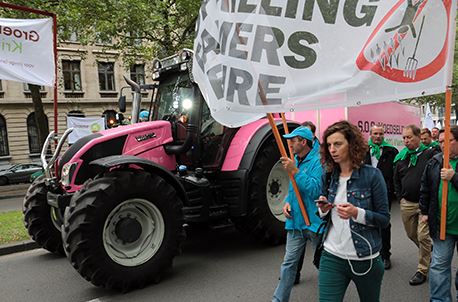



Europe Agriculture Crisis: Will €500 Million Be Enough?
ANALYSIS – An estimated 6,000 farmers and 2,000 tractors brought Brussels to a standstill yesterday as bureaucrats formulated strategies to stabilise the sector.But farm leaders have warned the European Commission’s Comprehensive Package of Measures is “far from sufficient” to have a noticeable impact.
They are concerned that the €500 million promised yesterday will not compensate for the loss of €5.5 billion pulled from EU farmers through Russia’s imports ban.

This is the view of European farming cooperative and union Copa-Cogeca, which was disappointed by what it called very few measures to help farmers deal with increasing volatility and short term problems.
The demonstrations saw farmers from across Europe gather to highlight the pressure of a farming sector hugely pressured by Russian trade sanctions, retailer power and a drop in Chinese demand for certain key goods.
Sectors with strong representation were dairy, pork, arable, beef and horticultural, many with varied demands, although fairer supply chains was a common theme across member states.
Unions across the UK called for a “fair share of risk and reward”.
In the build up to yesterday’s Extraordinary Agriculture and Fisheries Council, farmer calls focused on the retail sector to ensure fair prices, which the package has tried to address.
Finnish farmers, who consider themselves “among the biggest losers” from Russian sanctions, have seen €400 million of trade disappear.
This is according to Finnish farmer Kristian Westerholm, who was in attendance at the demonstration in Brussels. Presently, Finland is in its worst profit crisis in the country’s European history, he told Swedish Agricultural Producers Central Union (SLC).
The SLC, along with German Farmers’ Association President, Joachim Rukwied, made statements portioning much of the blame of “price misery” onto political tensions with Russia.
Mr Rukwied highlighted the issue of farm liquidity, also a key factor for others, as many farming unions called for short term cash flow assistance and longer term projects to develop futures markets and new trading opportunities.
Europe Commission Measures: What Have They Promised?
Around €500 million has been confirmed to pay for measures, most of which fall into three broad categories.
- Addressing the cash-flow difficulties farmers are facing
- Stabilising markets
- Addressing the functioning of the supply chain
Cash Flow
- Farm cashflows will be firstly supported with “targeted aid”. The Commission has said envelopes will be heading specifically to the dairy sector.
- Both direct and rural payments are to be brought forward if desired to October 16, with legislation pending to increase the proportion to 70 per cent for direct payments and possibly 85 per cent for rural development payments.
- A further initiative to link repayment schemes to commodity prices is being explored with the European Investment Bank and an Income Stabilisation Tool, available in some member states, could be rolled out into more Rural Development Programmes.
Around 6,000 farmers packed streets in Brussels as Commissioners discussed agricultural sector support
Stabilising Markets: “Stimulating Demand, Reducing Supply”
- Promotion package funding will be substantially increased, with focus on dairy and pork products. The reformed promotion policy which also foresees higher co-financing rates (from 50 to 70-80%), a broader list of eligible products (including generic pigmeat promotion on the internal market), gradually increasing the budget up to €200 million in 2019.
- Private Storage Aid for milk powder and butter has already been extended into 2016, with further promises to enhance aid on skimmed milk powder and introduce a PSA scheme for pigmeat.
- Efforts to open up more markets have also been discussed, including bilateral trade agreements, working to reduce non-tariff trade barriers (i.e. African Swine Fever) and opening up new markets. Agriculture Minister Phil Hogan is scheduled to visit Colombia and Mexico next year and work with USA, Japan, South America and Viet Nam was underlined.
Supply Chain Challenge
- One of the Commission’s key dairy schemes, the ‘Milk Package’ will be reviewed ahead of schedule in next year as opposed to 2018.
- Furthermore, a “High Level Group” will be formed by the Commission to explore farmer credit financial and risk hedging instruments, amongst other defined issues.
- Promotion of platforms to share experiences on “unfair” trading practices and financial and risk hedging instruments.
Action Now Needed
Copa-Cogeca secretary general Pekka Pensonen welcomed the new PSA scheme for pigmeat, insisting fat and lard must be included.
However, he said: "There are a few positive elements in the package but it falls short of our expectations. It includes very few measures to help manage the market or deal with the increasing volatility and short term problems.
"We welcome the fact that EU promotion schemes have been boosted and the Commission will speed up work to find new markets but this takes time The Commission knows there is a huge crisis in the sector but is refusing to treat it”.
NFU England president Meurig Raymond was disappointed with no intervention milk price review.
He called for a "fundamental culture change" across the supply chain, which he said the Commission is trying to address.
He was unsure about how much funding would come to the UK, and added: "We need to go much further if we are to offer British farmers the same protection they receive at home when they trade abroad." Pictures courtesy of MTK and SLC.
Michael Priestley
News Team - Editor
Mainly production and market stories on ruminants sector. Works closely with sustainability consultants at FAI Farms




